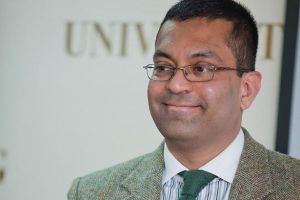
Kiran Fernandes
Summary
Professor Kiran Fernandes is the Associate Dean for Internationalisation and Professor of Operations Management at the Durham University Business School. He is also the Executive Director of the Northern Powerhouse Innovation Observatory, Fellow of University College Durham and the Wolfson Research Institute. He has been appointed by the UK Secretary of State for International Development as a Non-Executive Director of the UK National Commission (UKNC) for UNESCO with special responsibility for Higher Education, and in 2017 was elected vice-chair of the UKNC.
He is the Director of the Global Gateway’s Federation. He currently sits on a range of advisory panels covering various aspects of Operations and Innovation Management, Academic Advisory Council member of the Chartered Management Institute, and is member of a variety of editorial boards. He worked as a sub-systems engineer at the NASA – John C. Stennis Space Centre working for the Late Tom Cobb (Product Director for the Space Shuttle Main Engine Program). Working at NASA also allowed him to complete a professional program at the Massachusetts Institute of Technology (MIT).
He also has several different publications in operation management even being at the very top of his journals in his specific area. He has published widely in the area of operations management and sits on the editorial board of a number of top journals in the area. Professor Kiran Fernandes is a Chartered Engineer and advises a number of companies both nationally and internationally.
Biography
Academic Background Professor Kiran Fernandes has a PhD in Operations Management and Systems from the University of Warwick; a Masters (MS) from the James Worth Bagley College of Engineering at Mississippi State University (MSU) and a Bachelors of Engineering (Hons) degree in Production from Waltech.
He started his academic career as an EPSRC Senior Research Fellow at the University of Warwick, and due to his work with NASA, he completed a professional program at the Massachusetts Institute of Technology (MIT). Prior to his current role, Professor Kiran Fernandes worked as the Pro-Dean for Research and Head of the Operations Management Group at The University of York.
He started his academic career as an EPSRC Senior Research Fellow at the University of Warwick. Research Professor Kiran Fernandes’ main area of expertise is operation management which has led to his work being funded by the Engineering and Physical Sciences Research Council, Department for Business Innovation and Skills and also the Economic and Social Research Council. Professor Fernandes's research focuses mainly on modelling complex business domains ranging from operational processes to innovation diffusion to strategic decisions and complex systems.
Using a complex systems lens he has worked with construction, pharmaceutical, biotech and digital firms. It has even been funded by prestigious and competitive funding bodies like the Engineering and Physical Sciences Research Council, Department for Business Innovation and Skills, Economic and Social Research Council, Sun Microsystems, Chongqing Foreign Trade & Economic Relations Commission, Yorkshire Forward, Royal Academy of Engineering, British Council and Foreign and Commonwealth Office.
Vision
In a recent interview with Dinis Guarda, Fernandes spoke about his role at UNESCO:
"Being appointed the Vice-chair Vice-chair of the UK National Commission for UNESCO has given me the opportunity to explore with other members the current state of the UN's Sustainable Development Goals. These, being agreed upon by country members, look at how to improve the quality of life of people from an economic and societal perspective. One of the biggest challenges is that there are a majority of countries that aren’t actually making any progress in achieving these goals.
The reasons are many, but the most important one is finance. To achieve these goals by 2030, the cost is around $7 trillion globally. So what I have been trying to push within members is to stop tackling this individually, from a national perspective and start seeing the problem without national boundaries: all actors involved, globally, need to cooperate to achieve them together.”
“As well as industry 4.0. Industry 4.0 is a journey, not a race. Technologies will create a new way of understanding industry, new solutions that haven’t been taken into consideration before and it will even give way to new forms of jobs that haven't been created just yet.”
Recognition and Awards
References
- https://www.dur.ac.uk/business/research/management/profile/index.php?mode=staff&id=11444
- https://www.citiesabc.com/interview-kiran-jude-fernandes-associate-dean-internationalisation-durham-university-business-school-vice-chair-uk-national-commission-unesco/
- https://www.dur.ac.uk/directory/profile/?id=11444
- https://www.dur.ac.uk/wolfson.institute/
- https://scholar.google.com/citations?user=khDMoc8AAAAJ&hl=en
- https://books.google.co.uk/books?hl=en&lr=&id=1_KFldjML8wC&oi=fnd&pg=PR17&dq=info:0H27wrsMIjcJ:scholar.google.com&ots=rXmh9kIrF5&sig=7eOpTYcrgK17F7fXy2VQ_bf6Flo&redir_esc=y#v=onepage&q&f=false
- https://www.sciencedirect.com/science/article/pii/S0166497205000696
- https://dl.acm.org/doi/pdf/10.1145/903893.903929
- https://www.sciencedirect.com/science/article/abs/pii/092401369602465X
- https://www.sciencedirect.com/science/article/abs/pii/S0377221711007533
Discover up-to-date information on Business, Industry Leaders and Influencers, Organizations, Education, and Investors – connecting you to the knowledge you need.
